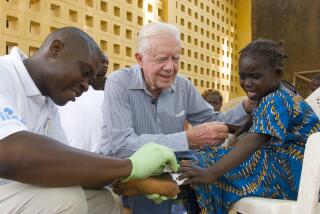AIDS: The Need for Leadership
The AIDS death march is accelerating dangerously around the world. Close to 13 million--including an increasing number of children--are infected with the human immunodeficiency virus (HIV), according to a new report by the Global AIDS Policy Coalition at Harvard University. And the death toll grows daily.
By 1995 nearly 20 million adults and more than 2 million children could be infected. By the year 2000, anywhere between 38 million and 120 million adults and children could test positive for HIV infection, according to the Harvard report “AIDS in the World.”
As AIDS reaches epidemic levels internationally, wealthier nations must provide more funds to control the spread both at home and abroad, particularly in developing countries.
By the end of this decade, according to the report, the largest proportion of HIV infections, 42%, will be in Asia and Oceania. Sub-Saharan Africa, now being devastated by the disease, will account for 31%, Latin America 8% and the Caribbean 6%. Because of these startling statistics, the World Health Organization needs a stronger commitment to efforts to contain the rapid spread, and areas at high risk should get a greater percentage of those funds.
Currently, the largest share of AIDS funding is spent in the comparatively rich nations of North America and Europe, countries like the United States that are also battling the epidemic.
AIDS will only get worse in the United States and elsewhere without a greater commitment to research, education, control and prevention. That commitment must start in this nation at the White House.
President-elect Bill Clinton should appoint an AIDS czar, someone such as former Surgeon General C. Everett Koop, to prod this nation. During his tenure from 1981 to 1989, Koop, serving in the Reagan Administration and the Bush Administration, refused to politicize his medical opinions. Despite strong political opposition from the White House, he tried courageously to alert this nation to the huge spread of AIDS among both heterosexuals and homosexuals.
An AIDS czar could give a vital sense of direction to the mammoth work left undone in the United States--and give a world deeply troubled by this epidemic’s relentless expansion a sense of a new American commitment.
More to Read
Sign up for Essential California
The most important California stories and recommendations in your inbox every morning.
You may occasionally receive promotional content from the Los Angeles Times.










